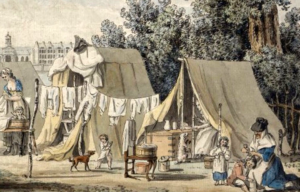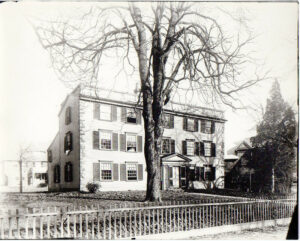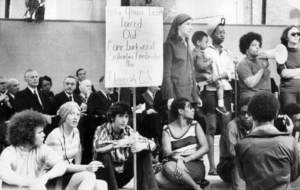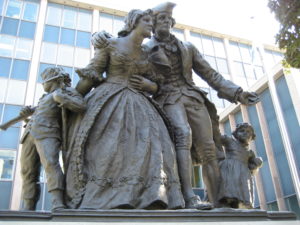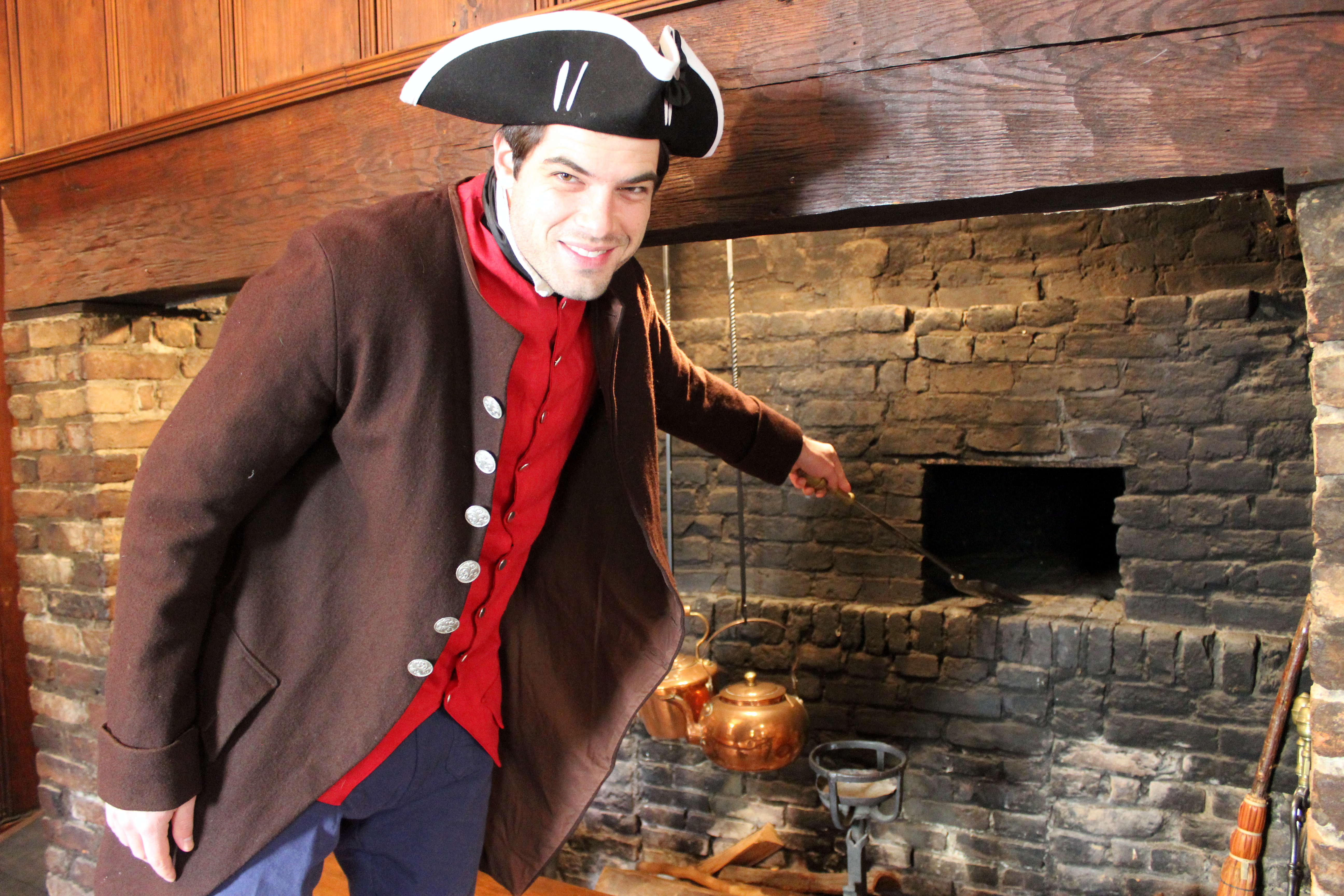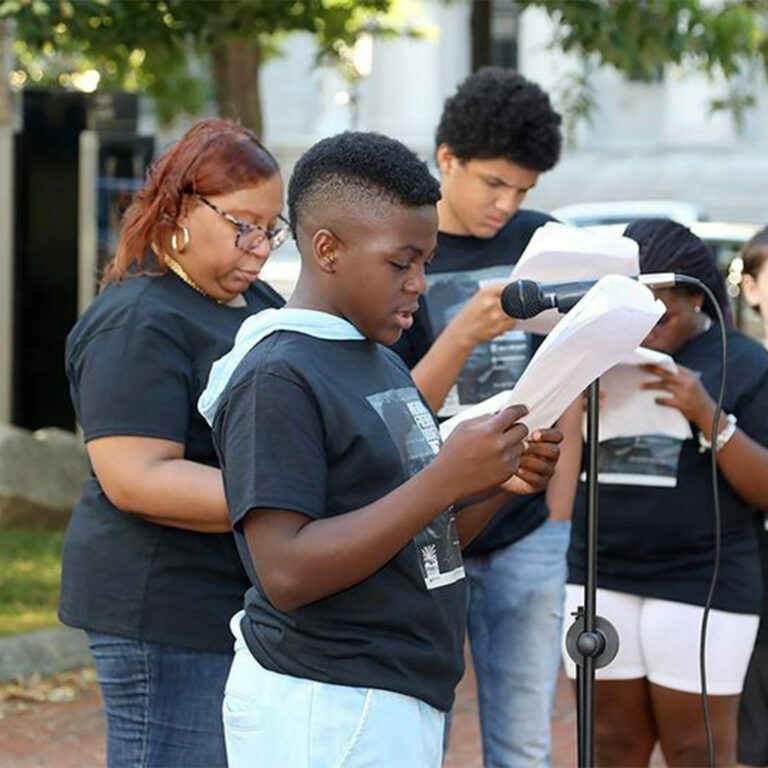
‘Reading Frederick Douglass Together’ events mark the Fourth poignantly and powerfully
Above image: Community members take turns reading excerpts from Frederick Douglass’ “What to the Slave is the Fourth of July?” (Photo: Mass Humanities)
The great writer and orator Frederick Douglass delivered a speech July 5, 1852, to the Ladies’ Antislavery Society in Rochester, New York. Since escaping his enslavement in Maryland 14 years earlier, Douglass had traveled the Northern states, speaking and writing about his own experiences and the need for a complete and immediate end to slavery. On this day, he delivered what is widely considered his most powerful speech, “What to the Slave is the Fourth of July?” In it, Douglass denounces the widespread celebrations of the Independence Day holiday, arguing that it was profoundly contradictory to laud the Founding Fathers for their commitment to liberty when more than 3 million Black Americans were still enslaved in the South.
Throughout his speech, Douglass recounts what he has seen, heard and experienced as an enslaved person and as a self-emancipated Black man who was always aware that his freedom was precarious at best. Written not long after the Fugitive Slave Act of 1850 that not only allowed but legally mandated the general public to aid in the capture and return of those fleeing enslavement, Douglass’ speech placed responsibility for the perpetuation of the slave system on Northern whites as well as their counterparts in the South. His language throughout paints a very clear distinction between white and Black Americans, as he argues that “the rich inheritance of justice, liberty, prosperity and independence, bequeathed by your fathers, is shared by you, not by me. The sunlight that brought light and healing to you, has brought stripes and death to me. This Fourth July is yours, not mine. You may rejoice, I must mourn.”
Over the past decade, public readings of “What to the Slave is the Fourth of July?” have become increasingly widespread and popular, many of them sponsored by the Massachusetts Foundation for the Humanities. Mass Humanities will sponsor readings this year in 37 communities around the state, held on town greens and city parks and in virtual spaces. Although readings can take place any time of year, the vast majority are centered around the period between the Juneteenth holiday (June 19) and Fourth of July.
At these public events, community members take turns reading pieces of the speech. This coming together of a diverse group of participants and listeners is one of the most important and meaningful aspects of the program for many. Community groups and local organizations had been holding readings for a number of years before 2020, but the murder of George Floyd that year and the emergence of the Black Lives Matter movement led to an increase of these public events as a way to express solidarity with the cause of racial justice, as well as a way to foster unity in a largely divided society.
Niki Lefebvre, executive director of the Natick Historical Society, describes the importance of NHS’ partnership with Natick for Black Lives Matter in cosponsoring the public readings held there since 2021. Lefebvre emphasizes the different but complementary strengths of the various organizations involved in the Natick reading. The long-standing historical society has the institutional capacity to put Douglass’ speech into the context of its time, aided by opening remarks by Natick resident Brenna Greer, professor of history at Wellesley College. But while it is able to give listeners background on the speech, NBLM is “on the ground, doing the work” of identifying injustice and working for change. This combination of historical perspective and current relevance is what Lefebvre argues makes Reading Frederick Douglass Together such a valuable contribution to and by the Natick community. Lefebvre adds that the financial and institutional support of Mass Humanities, which fully funds these readings and the community discussions that accompany them, has been crucial to their success.
Over the past several years, the increasing popularity and awareness of the Juneteenth holiday has led a number of organizations to shift the timing of their readings to coincide with this commemoration. Made a federal holiday in 2021, Juneteenth marks the day in June 1865 when word finally reached 250,000 enslaved people in Galveston, Texas, that the Civil War had ended, and that they were free. Although this holiday was often marked with celebrations in the Black community, particularly in Texas, it is also one that raises more complex emotions stemming from the entrenchment of the slave system, as well as the withholding of the news of emancipation from these many enslaved people for more than two months after the war’s end.
Whether held on Juneteenth, the Fourth of July or another significant date in Black history, the public readings sponsored by the Reading Frederick Douglass Together program provide a space for celebration of how far we have come and contemplation of how much we have left to do. Visit the Reading Frederick Douglass Together website to view a list of upcoming readings, including on Boston Common and at Medford’s Royall House and Slave Quarters, and to read the speech in its entirety.
Beth Folsom is programs manager for History Cambridge.
This article was originally published in our “Did You Know?” column in Cambridge Day.

